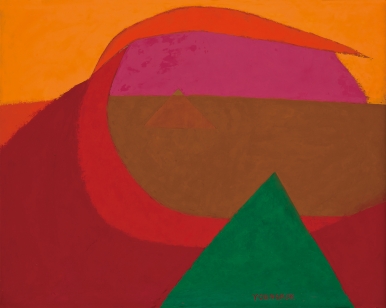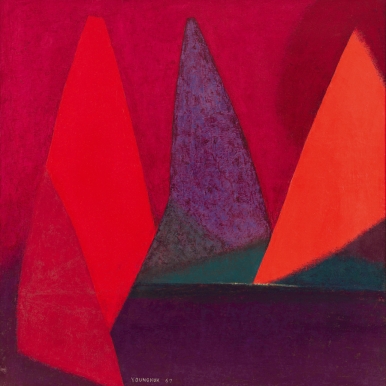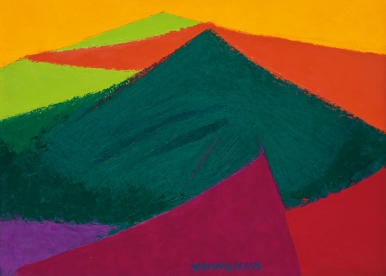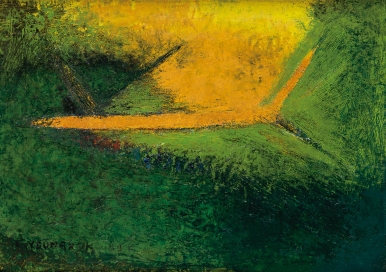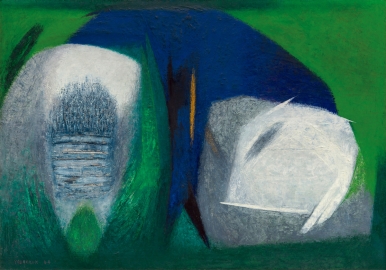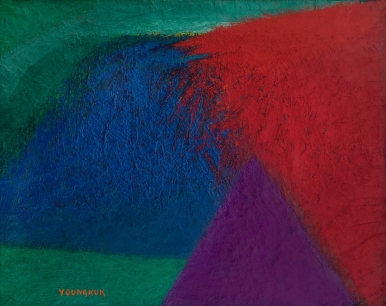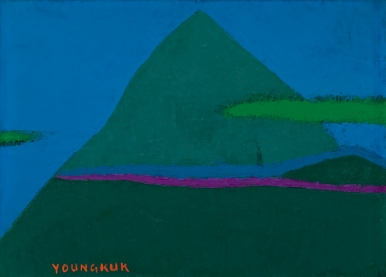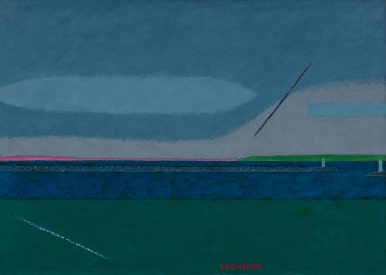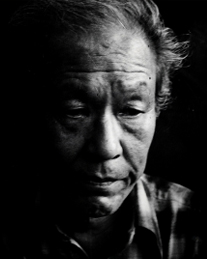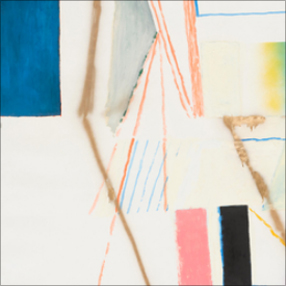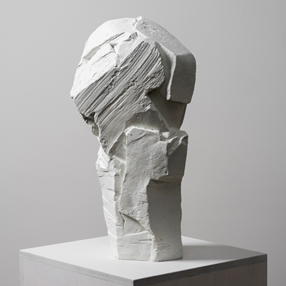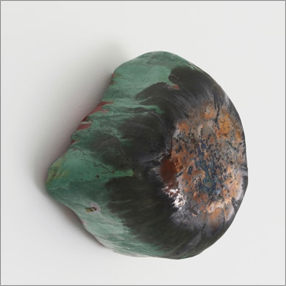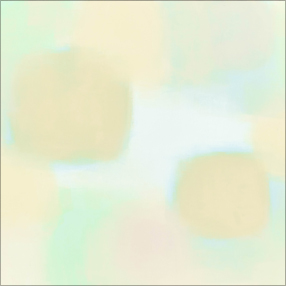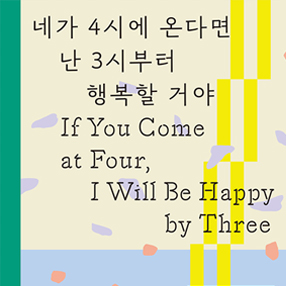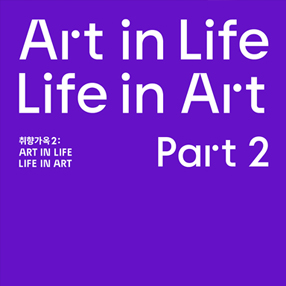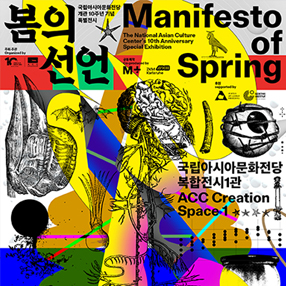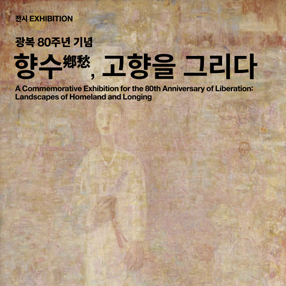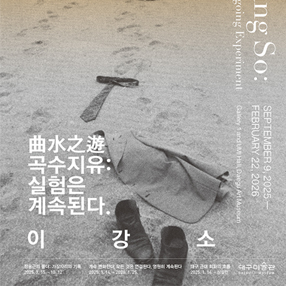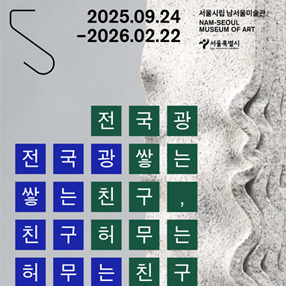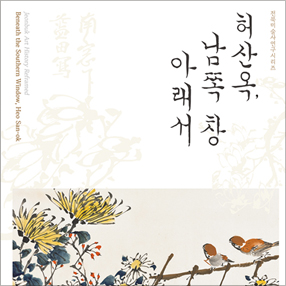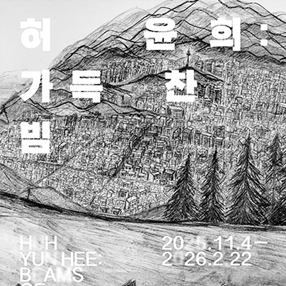본문
-
유영국
Work, 1974. Oil on canvas, 73.5 x 91.5 cm. © Yoo Youngkuk Art Foundation. Courtesy of PKM Gallery.
-
유영국
Work, 1967. Oil on canvas, 130 x 130cm. © Yoo Youngkuk Art Foundation. Courtesy of PKM Gallery.
-
유영국
Work, 1967. Oil on canvas, 24.5 x 33.3 cm. © Yoo Youngkuk Art Foundation. Courtesy of PKM Gallery.
-
유영국
Work, 1964. Oil on canvas, 25.2 x 35.5 cm. © Yoo Youngkuk Art Foundation. Courtesy of PKM Gallery.
-
유영국
Work (Terra Firma), 1964. Oil on canvas, 136 x 194 cm. © Yoo Youngkuk Art Foundation. Courtesy of PKM Gallery.
-
유영국
Work, 1965. Oil on canvas, 40.5 x 50.7 cm. © Yoo Youngkuk Art Foundation. Courtesy of PKM Gallery.
-
유영국
Work, 1976. Oil on canvas, 24.1 x 33 cm. © Yoo Youngkuk Art Foundation. Courtesy of PKM Gallery.
-
유영국
Work, 1981. Oil on canvas, 65.5 x 91 cm. © Yoo Youngkuk Art Foundation. Courtesy of PKM Gallery.
-
Press Release
PKM 갤러리는 2024년 하반기 첫 전시로, 8월 21일부터 10월 10일까지 한국의 1세대 추상화가 故 유영국 화백(1916-2002)의 개인전 «유영국의 자연: 내면의 시선으로»를 개최한다. 이번 전시에서는 작가 사후 최초로 공개되는 소품들을 포함, 유 화백의 1950–1980 년대 유화 작품 34 점과 화가로서의 삶의 궤적을 담은 아카이브 자료가 소개된다. 이를 통해 시대적 격변기를 거쳐가는 과정 속에서 어느 한쪽으로 치우치지 않으면서도 더욱 단단한 내면과 품위로 발현된 유 화백의 중용의 미학이 조명된다.
유영국 화백은 한국 추상 회화의 선구자로, 한국 전통의 자연관과 서양의 추상 미술을 접목하여 독창적인 예술 세계를 구축했다. 그는 한국 근현대사의 격랑 속에서 자연을 통해 예술과 삶의 본질을 통찰했으며, 시시각각 변화하는 자연의 모습을 작가 내면의 시선을 통해 우러나오는 색과 형태의 고유한 조합으로 표현하였다. 보이는 대상 이면의 근원적인 질서를 탐구하고 자연을 선과 면, 색채의 조합으로 리듬감 있게 전환시킨 유 화백의 탁월한 조형 감각은 시대를 넘어선 선명한 화면을 우리 앞에 당도하게 한다.
‘중용 Golden mean’이란 끊임없는 훈련과 절제를 통해 양극단 사이에서 균형을 이룬 상태를 뜻하는데, 유 화백의 작품에는 그러한 중용의 미덕이 곳곳에서 발견된다. 그의 화폭에서 산의 형상은 웅장한 동시에 평온하며, 정적이면서 끊임없이 변화하는 바다의 모습은 인생의 유동성과 불변함을 함께 보여준다. 또한 숲의 무성하면서도 질서 있는 형태는 복잡함 속에 조화를 갖춘 생태계 또는 인간 사회를 떠올리게 한다. 즉, 대상의 다양한 특성이 개별의 힘을 잃지 않으면서도 독특한 융합을 이루는 양상으로 그의 화면 속에 나타나게 되는 것이다.
이러한 중용의 미학은 유 화백의 형태와 기법, 색상에서도 드러난다. 그는 철저하게 계산된 기하학적 구조에 자연을 견고히 담기도 했지만, 유기적인 형태와 표현주의적인 붓 터치로 생동감 넘치는 자연을 표현하기도 했다. 그의 전작을 살펴보면 대담하고 강인한 인상과 섬세하고 온화한 느낌을 주는 작품들이 공존한다. 화려하고 강렬한 동시에 깊이 있고 우아한 그의 색상은 중도의 아름다움을 구현한다.
유 화백은 서구의 다양한 미술 사조를 수용하고 일본과 한국의 미술계와 활발히 교류하면서도, 외부 환경에 휩쓸리지 않고 고향 울진의 자연에 기반한 자신만의 조형 세계를 발전시켰다. 사회·정치적 혼란 속에서 예술에 대한 굳은 신념을 가지고 누구보다 헌신적인 예술가의 삶을 살았다. 자연이라는 한 가지 주제를 고수하면서도 새로운 시선으로 창조를 거듭했다. 이처럼 강직하면서도 유연하게 자신만의 독보적인 예술관을 구축한 유 화백의 작업은 오늘날 국제 무대에서도 보편적 공감대를 형성하며 큰 울림을 선사하고 있다.
유영국 화백은 1938년 일본 도쿄문화학원 유화과를 졸업하고 모던아트협회(1957-1958), 신상회(1962-1964) 등의 미술 단체를 주도적으로 이끌며 전후 한국 현대미술을 주도했다. 1964년 신문회관에서 첫 개인전을 가졌으며, 이후 타계 전까지 국립현대미술관 덕수궁 초대전(1979)을 포함해 15번의 개인전을 개최했다. 그는 자유미술가협회전 협회최고상(1938), 대한민국 예술원상 미술본상(1976), 보관문화훈장(1984) 등을 수상한 바 있다. 2016년에는 탄생 100주년을 기념하여 국립현대미술관에서 대규모 회고전이 열리면서 유 화백의 작품 세계가 재조명되었다. 현재 베니스에서 열리고 있는 «유영국: 무한 세계로의 여정» (퀘리니 스탐팔리아 재단, 2024.4.20-11.24) 은 유 화백의 첫 유럽 개인전이자 제 60회 베니스 비엔날레의 공식 병행전시로, 베니스 최고의 전시 중 하나라는 찬사를 받고 있다. 그의 작품은 국립현대미술관, 서울시립미술관, 리움미술관 등 유수 기관에 소장되어 있다.
PKM Gallery is pleased to announce Yoo Youngkuk: Stand on the Golden Mean, a solo exhibition by Yoo Youngkuk1916-2002, a pioneer of abstract painting in Korea, from August 21st to October 10th. The exhibition will feature 34 oil paintings from the 1950s to the 1980s, including small, previously unreleased works that will be displayed for the first time since the artist’s passing, along with archives that chronicle his trajectory as a painter. Yoo’s aesthetics – established with a solidified inner self and dignity, and remaining steadfast amid the upheavals of his time – will be further highlighted through this show.
Yoo, a first-generation Korean abstract painter, developed a unique artistic style by merging traditional Korean perspectives on nature with Western abstract art. Amidst the turbulent history of modern and contemporary Korea, Yoo gained profound insights into the essence of art and life through his observations of nature. He expressed the ever-changing qualities of nature through a distinctive combination of colors and forms that originated from his inner vision. Yoo’s exceptional formative sense, which explores the fundamental order of visible objects and rhythmically transforms nature through a combination of lines, planes, and colors, results in striking images that transcend time.
The “golden mean” refers to a state of balance between extremes achieved through constant discipline and moderation. This virtue is evident throughout Yoo’s work. His depiction of mountains conveys both the grandeur and tranquility of nature, while his representation of the quiet and dynamic sea captures the fluidity and immutability of life. The complex yet orderly shapes of forests evoke the harmonious intricacies of both ecosystems and human society. In other words, the various characteristics of the subject appear on his canvas as a unique fusion that retains the individual power of each element.
The aesthetics of the “golden mean” are also reflected in the shapes, techniques, and colors of Yoo’s work. Within a meticulously calculated geometric structure, Yoo represented nature in its pure form, while expressing its liveliness through organic contours and expressive brushstrokes. These works leave a bold impression, simultaneously imparting a sensitive and gentle feel. Moreover, his vivid yet refined colors embody a sense of balanced beauty.
While Yoo embraced various Western art trends and actively engaged with the art scenes in Japan and Korea, he also developed his own artistic vision, rooted in the nature of his hometown, Uljin, without being swayed by external trends. Despite social and political turmoil, he led an incomparable life of artistic devotion, with an unwavering belief in the power of art. Even with a focus on a single subject – nature – he continuously reinvented his perspective, creating new and profound works every time. Yoo’s art, which has established his own unique artistic view with both firmness and flexibility, carries universal appeal and resonates deeply with those who experience it.
After graduating from the Department of Oil Painting at Bunka Gakuin University, Tokyo, in 1938, Yoo Youngkuk led Korean avant-garde art groups such as the Modern Art Association(1957-1958) and SinSang-Hoe(1962-1964), becoming a prominent figure in Korean art history. He held a total of fifteen solo exhibitions before his passing, including his first solo show at the Korea Press Center in 1964 and the Invitational Exhibition(1979) at the National Museum of Modern and Contemporary Art, Deoksugung. Yoo was awarded The Best Awards for Work R3(1938) at the 2nd Exhibition of Association of Free Artists, the NAA Awards (Fine Art)(1976), and the Bo-Gwan Order of Cultural Merit(1984). In 2016, a major retrospective was held at the National Museum of Modern and Contemporary Art, Seoul, to commemorate the 100th anniversary of his birth. His first debut exhibition in Europe, A Journey to the Infinite: Yoo Youngkuk (Querini Stampalia, 2024. 4. 20 – 11. 24) is currently on view as a Collateral Event of the 60th Venice Biennale, receiving acclaim as one of the best exhibitions in Venice. His works are held in the collections of major institutions such as the National Museum of Modern and Contemporary Art, Seoul Museum of Art, and Leeum Museum of Art.전시제목유영국의 자연: 내면의 시선으로
전시기간2024.08.21(수) - 2024.10.10(목)
참여작가 유영국
관람시간10:00am - 06:00pm
휴관일일요일, 월요일 휴무
장르회화
관람료무료
장소PKM 갤러리 PKM Gallery (서울 종로구 삼청로7길 40 (삼청동, 피케이엠 갤러리) )
연락처02-734-9467
-
Artists in This Show
-
1916년 경북 울진출생
-
PKM 갤러리(PKM Gallery) Shows on Mu:umView All
Current Shows
-
네가 4시에 온다면 난 3시부터 행복할 거야
수원시립미술관
2025.04.15 ~ 2026.02.22
-
취향가옥 2: Art in Life, Life in Art 2
디뮤지엄
2025.06.28 ~ 2026.02.22
-
국립아시아문화전당 개관 10주년 기념 특별전시 《봄의 선언》
국립아시아문화전당
2025.09.05 ~ 2026.02.22
-
광복 80주년 기념 «향수(鄕愁), 고향을 그리다»
국립현대미술관
2025.08.14 ~ 2026.02.22
-
이강소_曲水之遊 곡수지유: 실험은 계속된다
대구미술관
2025.09.09 ~ 2026.02.22
-
전국광: 쌓는 친구, 허무는 친구
서울시립 남서울미술관
2025.09.24 ~ 2026.02.22
-
허산옥, 남쪽 창 아래서
전북도립미술관
2025.11.14 ~ 2026.02.22
-
허윤희: 가득찬 빔
대구미술관
2025.11.04 ~ 2026.02.22




